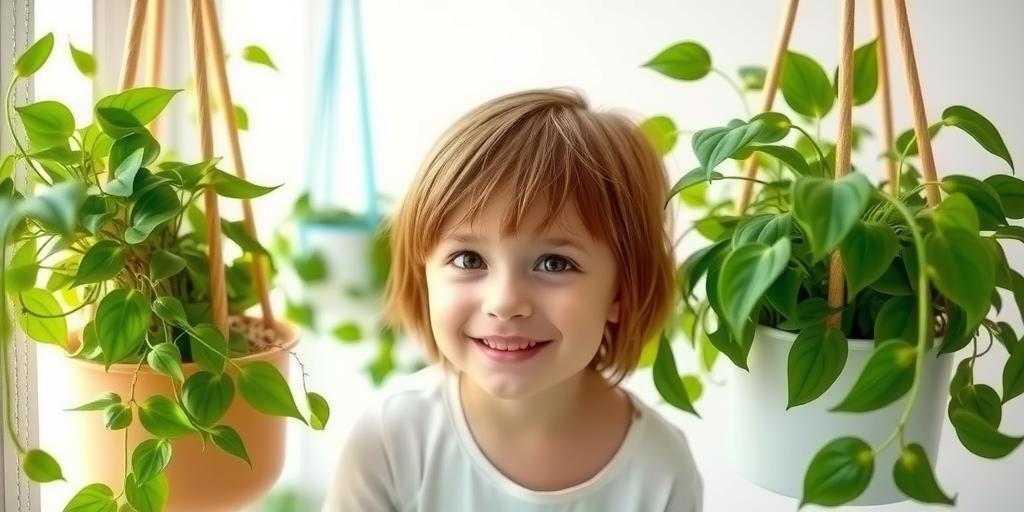
Non-Toxic Low Light Hanging Plants Safe for Kids Rooms
Looking for the best non-toxic, low-light hanging plants for your child’s room? Discover safe, easy-care options that purify the air and add a touch of nature to their space!
Introduction
Did you know indoor plants can improve air quality by up to 60%? But when it comes to kids’ rooms, safety is key! Not all plants are child-friendly, and some thrive better in low-light conditions—perfect for spaces with minimal sunlight. In this guide, we’ll explore the best non-toxic hanging plants that are safe for kids, easy to maintain, and ideal for rooms with limited natural light. Let’s bring a little greenery into your child’s sanctuary—without the worry!
Why Choose Non-Toxic Hanging Plants for Kids’ Rooms?
The Importance of Child-Safe Plants
Kids are naturally curious, and if they see a plant, they might want to touch or even taste it. That’s why choosing non-toxic plants is a must. Some common houseplants can cause skin irritation, stomach upset, or worse if ingested. By picking plants that are safe for little ones, you eliminate that risk while still bringing greenery into their space.
Benefits of Hanging Plants
Hanging plants are a fantastic solution for kids’ rooms because they keep foliage out of reach. No more worrying about tiny hands yanking leaves or knocking over pots. Plus, hanging plants save floor and shelf space, which is great for smaller rooms. They also add a fun, whimsical touch that kids love—imagine trailing vines or fluffy ferns dangling from the ceiling!
How Low-Light Plants Adapt to Indoor Conditions
Not every kid’s room has big, sunny windows—and that’s okay! Low-light plants are naturally adapted to thrive in dimmer conditions, making them perfect for spaces with limited sunlight. These plants usually come from forest floors or shaded areas in nature, so they’re built to handle less light. This means they’ll stay healthy even if the room only gets indirect sunlight.
Top Non-Toxic Low Light Hanging Plants for Kids’ Rooms
Spider Plant (Chlorophytum comosum)
Spider plants are practically indestructible, making them a great choice for busy families. They’re non-toxic, so even if your child takes a tiny nibble (because let’s face it, toddlers explore with their mouths), there’s no need to panic. Plus, they’re excellent air purifiers, helping to keep the room fresh. Their long, arching leaves and baby “spiderettes” add a playful look.
Boston Fern (Nephrolepis exaltata)
If you want something lush and full, a Boston fern is a fantastic pick. It loves humidity, so it’s perfect for bathrooms or rooms with a humidifier. Safe for kids and pets, this fern adds a jungle-like vibe with its soft, feathery fronds. Just keep the soil moist (but not soggy), and it’ll thrive.
Pothos (Epipremnum aureum – Non-Toxic Varieties)
Pothos is a superstar for beginners—it grows fast, trails beautifully, and is super forgiving if you forget to water it. However, some varieties are toxic, so stick to kid-safe types like ‘Pearls and Jade’ or ‘Jade Pothos.’ Always double-check before buying!
Parlor Palm (Chamaedorea elegans)
This petite palm is a great low-maintenance option. It’s safe for kids and pets, tolerates low light, and adds a tropical feel to the room. Its delicate fronds give a soft, airy look, and it grows slowly, so it won’t take over the space.
String of Hearts (Ceropegia woodii)
For something a little more whimsical, try a String of Hearts. Its dainty, heart-shaped leaves cascade down in long vines, creating a fairy-tale effect. It’s safe for kids, drought-tolerant, and doesn’t need much light—just occasional watering when the soil dries out.
How to Care for Low Light Hanging Plants
Watering Tips
Overwatering is the #1 killer of houseplants. Always check the soil before watering—stick your finger in about an inch deep. If it’s dry, it’s time to water; if it’s still damp, wait a few more days. Most low-light plants prefer slightly dry conditions, so err on the side of underwatering rather than drowning them.
Best Placement
Even low-light plants need some light. Place them near a window with filtered sunlight or in a spot where they get bright, indirect light for a few hours a day. Avoid dark corners or areas with cold drafts (like near air vents or open windows in winter).
Pruning and Maintenance
Keep your plants looking neat by trimming dead or yellowing leaves. For trailing plants like Pothos or String of Hearts, you can pinch back the vines to encourage bushier growth. Regular pruning also prevents the plant from becoming too leggy.
Fertilizing Basics
Low-light plants don’t need much fertilizer, but a gentle, organic option (like diluted fish emulsion or worm castings) can give them a boost during growing seasons (spring and summer). Skip fertilizing in fall and winter when growth slows down.
Styling Tips: Hanging Plants in Kids’ Rooms
Creative Hanging Ideas
Macramé hangers add a boho touch, while ceiling hooks keep things simple. For a playful twist, try wall-mounted shelves where plants can trail down like a living curtain. Just make sure everything is securely fastened—safety first!
Pairing Plants with Playful Décor
Let your child’s personality shine by using themed pots—think dinosaurs, spaceships, or unicorns. Adding fairy lights around the plants creates a magical nighttime glow. You can even turn plant care into a game by letting your little one pick out fun watering cans or mini gardening tools.
Teaching Kids About Plant Care
Involving kids in plant care teaches responsibility and nurtures a love for nature. Let them help with watering (using a small spray bottle for little hands) or checking the soil. It’s a great way to bond and spark curiosity about the natural world.
Common Mistakes to Avoid
Choosing Toxic Plants by Mistake
Always verify a plant’s safety before bringing it home. Some common houseplants, like Peace Lilies or certain Pothos varieties, can be harmful if ingested. Stick to trusted non-toxic lists from sources like the ASPCA or reputable plant blogs.
Overwatering or Neglecting Light Needs
Even low-light plants need some light—don’t stick them in a pitch-black closet! And while they’re forgiving, they still need proper care. Check their light and water needs regularly to keep them thriving.
Forgetting to Secure Hanging Planters
A falling planter could hurt a child or pet. Make sure hooks, shelves, or hangers are firmly installed and can support the weight of the plant. Test them before hanging, and avoid placing plants directly above beds or play areas.
By keeping these tips in mind, you can create a safe, green oasis in your child’s room that’s both beautiful and worry-free!
Conclusion
Adding non-toxic, low-light hanging plants to your child’s room is a wonderful way to enhance their space with nature—safely! From air-purifying spider plants to trailing string of hearts, there are plenty of beautiful, kid-friendly options. Just remember to choose the right plants, place them thoughtfully, and involve your little ones in their care. Ready to green up their room? Pick your favorite from our list and watch their space bloom with life!
